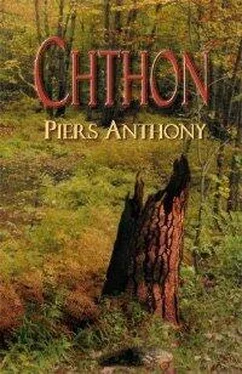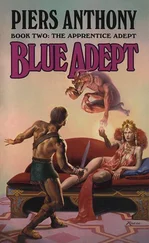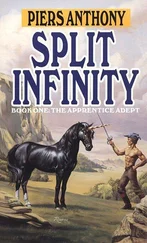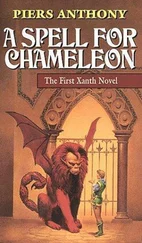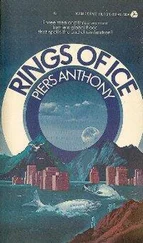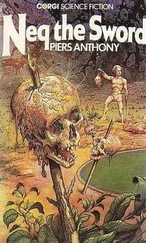Piers Anthony - Chthon
Здесь есть возможность читать онлайн «Piers Anthony - Chthon» весь текст электронной книги совершенно бесплатно (целиком полную версию без сокращений). В некоторых случаях можно слушать аудио, скачать через торрент в формате fb2 и присутствует краткое содержание. Город: 1967, Издательство: Ballantine, Жанр: Фантастика и фэнтези, на английском языке. Описание произведения, (предисловие) а так же отзывы посетителей доступны на портале библиотеки ЛибКат.
- Название:Chthon
- Автор:
- Издательство:Ballantine
- Жанр:
- Год:неизвестен
- Город:1967
- ISBN:нет данных
- Рейтинг книги:5 / 5. Голосов: 1
-
Избранное:Добавить в избранное
- Отзывы:
-
Ваша оценка:
- 100
- 1
- 2
- 3
- 4
- 5
Chthon: краткое содержание, описание и аннотация
Предлагаем к чтению аннотацию, описание, краткое содержание или предисловие (зависит от того, что написал сам автор книги «Chthon»). Если вы не нашли необходимую информацию о книге — напишите в комментариях, мы постараемся отыскать её.
Nominated for the Hugo Award for Best Novel in 1968.
Chthon — читать онлайн бесплатно полную книгу (весь текст) целиком
Ниже представлен текст книги, разбитый по страницам. Система сохранения места последней прочитанной страницы, позволяет с удобством читать онлайн бесплатно книгу «Chthon», без необходимости каждый раз заново искать на чём Вы остановились. Поставьте закладку, и сможете в любой момент перейти на страницу, на которой закончили чтение.
Интервал:
Закладка:
Hairy? In the caves?
Was this the sign that the exit was near?
He brought the thing into sight. It was not hairy after all. It was an enormous lizard, rapping at the wall with strong buck teeth: a stone chipper, not a carnivore, eating the green glow. Probably harmless after all. Surely the chimera had preyed on something before it had discovered man.
Aton came at it from behind, studying for a vital spot beneath the leathery scales. The creature was large, the size of a man, standing on its two hind feet and bracing its front members against the wall. It did not turn; either it could not hear him, or did not consider him dangerous.
He plunged the makeshift blade in under the right fore-leg, where the scales were thin. It went in easily, ripping through soft flesh. The chipper fell to the floor soundlessly, not understanding, clutching at the wound with the opposite claw. Dumbly it tore itself open, trying to stop the pain, as Aton stood and watched, breathing heavily. After a while he cut out its eyes and left it, struggling yet, stirring its own gore into the green stone.
The walls closed in again, and the river and the path resumed. This time he saw shapes in the water: eyeless, rubbery fins, flexing about from side to side along the bottom. Marine life, at last.
The miles passed uneventfully. Abruptly the passage ended. The water plunged from a tall vertical tunnel, bubbling in a circular pool and flowing on into the bed he had been tracing. The path circled this small pool and diverged. Through the rock it bored, a round passage.
Aton looked down that sharply cut passage and saw nothing. He put his ear to the wall and heard a distant tapping, a heart-beat. Something was at the other end. Something large.
He looked into the pool and saw a strange globular jellyfish deep below, perhaps a yard in diameter, balanced in a pothole just out of the striking falls. He craned upward and saw—light. Daylight.
The wall of the shaft was rough. The severed strata defended themselves in concentric circles, some reaching an inch or more in toward the glassy column of plummeting water. One side was comparatively smooth, as though the water had eroded it clean during some capricious house-keeping effort; but now there was a foot or more of space on every side, between wall and water.
Aton removed his water-skin—a ludicrous impediment in the circumstances—parked it with his other supplies, and prepared for the most difficult climb of his life.
The diameter of the shaft was about a yard at the bottom, and it appeared to expand slightly at the top. Aton braced his back against the smooth side, spread his arms in a semicircle against the wall at shoulder level, and lifted one foot around the devastating center column to find a purchase against the opposite side. He brought the other foot into play and began to climb, letting the river plunge harmlessly between his spread thighs. With his arms he lifted his back away and up; then took two baby steps up the far side. Again and again, advancing two or three inches at a time.
The climb was not hard, at first, but there was a long way to go.
He decided not to conserve his strength, since even the act of resting in such a position would fatigue him. If he could achieve the top quickly, there should be ample opportunity to rest. If he did not get there promptly, fatigue might prevent him from reaching it at all.
He accelerated his pace, humping up in a rocking pattern, sometimes painfully, the muscles of his legs bunching and relaxing and bunching again. His arms grew tired first, and he turned them down at the elbows, wriggling just enough to make progress, scraping his elbows but not caring.
Fatigue rose about him, but he kept on. His eyes stared fixedly into the still center of the column so close at hand, letting those depths mesmerize him. He wanted to let go of the wall for just a moment and embrace that perfect shape, and ride it down smoothly to the base, kissing its clean surface. Suddenly he was thirsty, more thirsty than ever before in his life, excruciatingly so—and the cool spray on his face tantalized tongue and throat.
One drink, he knew, and it would be over. It was the cup of death he sought, denied him by air and fire but never so deliciously close as this.
Death. Why had he killed that chipper? It had been an act of sadism, an act he had enjoyed. Why? Why did he want to die? What was the matter with him?
In the glass before him the liquid eyes of Malice shone, hinting at an answer he dared not grasp. She was in the fire; she was in the water. The prisoners of Chthon were right to fear him. He was in love with evil.
But the power of that image bore him up. He had been unable, before, to kill the object of his terror. The ties of childhood had been too strong. But after the rigors of Chthon he would have that strength, and he would do what had to be done.
First he would unravel the mystery of the minionette, traveling to the home world that Hastings, for a private garnet, had discussed. Minion—a proscribed planet whose location was as secret as that of Chthon, because of its deadly inhabitants. No—they were human, but genetic engineering could do strange things within the shell of the human body, and leave it less compatible to the mainstream of the species than many an alien shape. No, Hastings had not actually known what it was about the inhabitants, he had claimed, and had left suddenly, as though repulsed by Aton’s inquiry. Hastings no longer talked to Aton; no one did, any more, except Bossman, curtly, and Garnet.
Yet— he was not of Minion. He only wanted to know. What did these rough prisoners see in him, that drove them back?
Why had he killed the chipper? It was Malice that needed killing. He was the enemy of the minionette, not of others. Except for that need, he was a free agent.
“And each in the cell of himself is almost convinced of his freedom,” the ancient poet Auden had said in the remembered depths of LOE , now boarded by Garnet. Almost convinced!
His straining body had hoisted him very near the top. The endless tunnels waited eighty feet below, and well might wait in vain. Five feet above, daylight spilled over the lip; light mixed with the pouring water. The green glow was gone, unable to face the sun; and it was bright, far brighter than he could remember any day ever being—on a habitable world.
Was he to be helpless against the brilliance of freedom? He waited, staring into it, forcing his eyes to adjust, before going on.
His head came up above the turn and he saw the surface of the planet, just feet away. The mouth of the cave was open to a level sheen of water, sucking it down. Reflected from the distance was a tree—a palm tree. The smell of the outdoors wafted in luxuriantly.
Rising out of the water to meet the upper dome were the stalagmites of man: steel bars. A perfect prison: the sound of the falls would override any effort to call for help, assuming that there were any human ears to hear it, and assuming that such an ear did not belong to a prison guard. The bars, of course, would be proof against tampering. Any effort to break or dislodge them would sound the alarm. Set inside the cave, they prevented visible signaling; the water, coming in, would carry no messages out.
Almost convinced.
This was not the escape from Chthon. This was the ration of Tantalus.
Aton never remembered the descent. He found himself lying on the narrow footpath, aching in shoulders, back, and thighs, abrasions stinging the length of his backside and the soles of his feet. A word was ringing the length of his mind and through the echoing tunnels of his brain. He concentrated and it came: rill.
And suddenly he knew with a faith that denied coincidence the true identity of the surface of Chthon, saw the poetic allegory of it and the irony of his denied redemption. What would there be above hell, except heaven? It was right, it was right, he told himself, that he be refused from below that which he had cast down from above. The cell of himself was not ready for freedom.
Читать дальшеИнтервал:
Закладка:
Похожие книги на «Chthon»
Представляем Вашему вниманию похожие книги на «Chthon» списком для выбора. Мы отобрали схожую по названию и смыслу литературу в надежде предоставить читателям больше вариантов отыскать новые, интересные, ещё непрочитанные произведения.
Обсуждение, отзывы о книге «Chthon» и просто собственные мнения читателей. Оставьте ваши комментарии, напишите, что Вы думаете о произведении, его смысле или главных героях. Укажите что конкретно понравилось, а что нет, и почему Вы так считаете.
